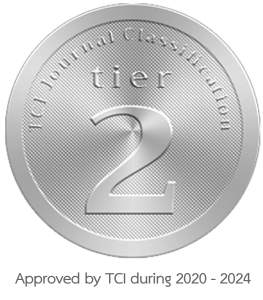Using quizizz to enhance the vocabulary knowledge of English students at a private university
DOI:
https://doi.org/10.62819/jel.2024.594Keywords:
English language learning, game-based platform, Quizizz, vocabulary knowledgeAbstract
The purpose of this study was to investigate the relationship between the Quizizz game-based platform and vocabulary knowledge. The researchers employed a quasi-experimental design with 241 first-year students enrolled in English classes at a private university in Nakhon Pathom, Thailand. A paired t-test statistical analysis was used to compare the pre-test and post-test results, while a 5-point Likert scale was used to assess the opinions of the students/participants. The pre-test was administered before introducing the vocabulary exercises using the Quizizz game-based online platform. At the end of the four-month intervention period, a post-test was conducted along with the attitudinal survey. The results showed a significant improvement in favor of using a game-based platform, with a statistical difference of .01, indicating that students had substantially enhanced vocabulary knowledge. Moreover, students' opinions on using Quizizz were overwhelmingly positive. These findings aligned with previous research suggesting that Quizizz effectively enhances vocabulary knowledge. Most importantly, based on the findings of the present research, it was recommended that Quizizz be utilized to enhance vocabulary knowledge in English classes for college students.
References
Bal, S. (2018). Using quizizz.com to enhance pre-intermediate students’ vocabulary knowledge. International Journal of Language Academy, 6(1), 295–303.
Blachowicz, C. L., & Fisher, P. (2008). Attentional vocabulary instruction: Read-aloud, word play, and other motivating strategies for fostering informal word learning. What research has to say about vocabulary instruction, 32–55. Newark, DE.
Boonkongsaen, N., & Intaraprasert, C. (2014). Use of English vocabulary learning strategies by Thai tertiary-level students in relation to fields of study and language-learning experiences. English Language Teaching, 7(5), 59–70. https://doi.org/10.5539/ELT.V7N5P59
Carlo, M. S., August, D., McLaughlin, B., Snow, C. E., Dressler, C., Lippman, D. N., Lively, T. J., & White, C. E. (2004). Closing the gap: Addressing the vocabulary needs of English‐language learners in bilingual and mainstream classrooms. Reading Research Quarterly, 39(2), 188–215. https://doi.org/10.1598/RRQ.39.2.3
Castro, R. (2018). The effects of using gamification learning in developing vocabulary knowledge of English I students at a private university in Nakhon Pathom. Christian University of Thailand Journal, 24(4), 577–587.
Coyne, M. D., Simmons, D. C., Kame’enui, E. J., & Stoolmiller, M. (2004). Teaching vocabulary during shared storybook readings: An examination of differential effects. Exceptionality, 12(3), 145–162. https://doi.org/10.1207/S15327035EX1203_3
Graves, M. F. (2006). A vocabulary program to complement and bolster a middle-grade comprehension program. In B. Taylor, M. Graves, & P. van den Broek (Eds.), Reading for meaning: Fostering comprehension in middle grades (pp. 116–135). International Reading Association.
Hughes, J., & Milner, M. (2020). World English (3rd ed.), 1. National Geographic Learning.
Junior, J. B. B. (2019). Assessment for learning with mobile apps: Exploring the potential of Quizizz in the educational context. International Journal of Development Research, 10(1), 33366–33371.
Kayaoglu, M., Akbas, D., & Ozturk, Z. (2011). A small-scale experimental study: Using animations to learn vocabulary. Turkish Online Journal of Educational Technology, 10, 24-30 Apr 2011.
Liangpanit, C. (2015). Vocabulary learning strategies for Thai learners: Research to Practice. Journal of Humanities and Social Sciences. Thaksin University, 15(2), 119–131.
Linh, N. D., & Suppasetseree, S. (2016). The development of an instructional design model on Facebook based collaborative learning to enhance EFL students’ writing skills. IAFOR Journal of Language Learning, 2(1), 48–66. https://doi.org/10.22492/ijll.2.1.04
Meng, C. K., Nasir, J. S. B. M., Choo, K. A., & Ming, T. M. (2019). A gamified classroom with technical and vocational education and training (TVET) students using Quizizz. Newera University College.
Motteram, G. (2013). Voices. The benefits of new technology in language learning. British Council.
Nation, I. S. P. (1994). Review of three books on vocabulary teaching. System, 22(2), 15–19.
Orawiwatnakul, W. (2011). Impacts of vocabulary acquisition techniques instruction on students’ learning. Journal of College Teaching and Learning, 8(1), 47–53. https://doi.org/10.19030/tlc.v8i1.985
Panmei, B., & Waluyo, B. (2022). The pedagogical use of gamification in English vocabulary training and learning in higher education. Education Sciences, 13(1), 24. https://doi.org/10.3390/educsci13010024
Rajendan, T., Naaim, N. A. B., & Yunus, M. M. (2019). Pupils’ motivation and perceptions towards learning English using Quizvaganza. International Journal of Scientific and Research Publications, 9(1), 220–227.
Saengpakdeejit, R. (2014). Strategies for dealing vocabulary learning problems by Thai university students. Silpakorn University Journal of Social Sciences, Humanities and Arts, 14(1), 147–167.
Sedita, J. (2005). Effective vocabulary instruction. Insights on Learning Disabilities, 2(1), 33–45.
Suing, J. (2019). The effects of Marzano’s six step vocabulary process, on fourth grade students’ vocabulary knowledge, fluency, and sentence complexity. Doctor of education major: Educational Administration. University of Nebraska.
Templeton, S., Bear, D. R., Invernizzi, M., & Johnston, F. (2010). Vocabulary their way. Pearson.
Wichadee, S., & Pattanapichet, F. (2018). Enhancement of performance and motivation through application of digital games in an English language class. Teaching English with Technology, 18(1), 77–92.
Wilkins, D. (1972). Linguistics in language teaching. Arnold.
Zhao, F. (2019). Using Quizizz to integrate fun multiplayer activity in the accounting classroom. International Journal of Higher Education, 8(1), 37–43. https://doi.org/10.5430/ijhe.v8n1p37


















